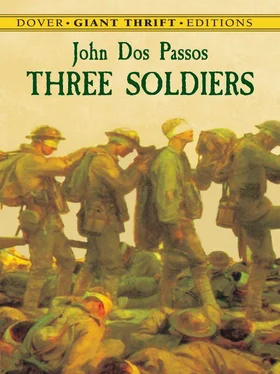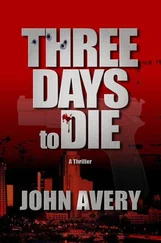He took off his clothes slowly and got into bed. The smell of the hyacinths came to him very faintly, so that he did not know whether or not he was imagining it.
The major’s office was a large white-painted room, with elaborate mouldings and mirrors in all four walls, so that while Andrews waited, cap in hand, to go up to the desk, he could see the small round major with his pink face and bald head repeated to infinity in two directions in the grey brilliance of the mirrors.
“What do you want?” said the major, looking up from some papers he was signing.
Andrews stepped up to the desk. On both sides of the room a skinny figure in olive-drab, repeated endlessly, stepped up to endless mahogany desks, which faded into each other in an endless dusty perspective.
“Would you mind O.K.-ing this application for discharge, Major?”
“How many dependents?” muttered the major through his teeth, poring over the application.
“None. It’s for discharge in France to study music.”
“Won’t do. You need an affidavit that you can support yourself, that you have enough money to continue your studies. You want to study music, eh? D’you think you’ve got talent? Needs a very great deal of talent to study music.”
“Yes, sir… But is there anything else I need except the affidavit?”
“No… It’ll go through in short order. We’re glad to release men… We’re glad to release any man with a good military record… Williams!”
“Yes, sir.”
A sergeant came over from a small table by the door.
“Show this man what he needs to do to get discharged in France.”
Andrews saluted. Out of the corner of his eye he saw the figures in the mirror, saluting down an endless corridor.
When he got out on the street in front of the great white building where the major’s office was, a morose feeling of helplessness came over him. There were many automobiles of different sizes and shapes, limousines, runabouts, touring cars, lined up along the curb, all painted olive-drab and neatly stencilled with numbers in white. Now and then a personage came out of the white marble building, puttees and Sam Brown belt gleaming, and darted into an automobile, or a noisy motorcycle stopped with a jerk in front of the wide door to let out an officer in goggles and mud-splattered trench coat, who disappeared immediately through revolving doors. Andrews could imagine him striding along halls, where from every door came an imperious clicking of typewriters, where papers were piled high on yellow varnished desks, where sallow-faced clerks in uniform loafed in rooms, where the four walls were covered from floor to ceiling with card catalogues. And every day they were adding to the paper, piling up more little drawers with index cards. It seemed to Andrews that the shiny white marble building would have to burst with all the paper stored up within it, and would flood the broad avenue with avalanches of index cards.
“Button yer coat,” snarled a voice in his ear.
Andrews looked up suddenly. An M.P. with a rawlooking face in which was a long sharp nose, had come up to him.
Andrews buttoned up his overcoat and said nothing.
“Ye can’t hang around here this way,” the M.P. called after him.
Andrews flushed and walked away without turning his head. He was stinging with humiliation; an angry voice inside him kept telling him that he was a coward, that he should make some futile gesture of protest. Grotesque pictures of revolt flamed through his mind, until he remembered that when he was very small, the same tumultuous pride had seethed and ached in him whenever he had been reproved by an older person. Helpless despair fluttered about within him like a bird beating against the wires of a cage. Was there no outlet, no gesture of expression, would he have to go on this way day after day, swallowing the bitter gall of indignation, that every new symbol of his slavery brought to his lips?
He was walking in an agitated way across the Jardin des Tuileries, full of little children and women with dogs on leashes and nursemaids with starched white caps, when he met Geneviève Rod and her mother. Geneviève was dressed in pearl grey, with an elegance a little too fashionable to please Andrews. Mme. Rod wore black. In front of them a black and tan terrier ran from one side to the other, on nervous little legs that trembled like steel springs.
“Isn’t it lovely this morning?” cried Geneviève.
“I didn’t know you had a dog.”
“Oh, we never go out without Santo, a protection to two lone women, you know,” said Mme. Rod, laughing. “Viens, Santo, dis bon jour au Monsieur.”
“He usually lives at Poissac,” said Geneviève.
The little dog barked furiously at Andrews, a shrill bark like a child squalling.
“He knows he ought to be suspicious of soldiers… I imagine most soldiers would change with him if they had a chance… Viens Santo, viens Santo… Will you change lives with me, Santo?”
“You look as if you’d been quarrelling with somebody,” said Geneviève Rod lightly.
“I have, with myself… I’m going to write a book on slave psychology. It would be very amusing,” said Andrews in a gruff, breathless voice.
“But we must hurry, dear, or we’ll be late to the tailor’s,” said Mme. Rod. She held out her black-gloved hand to Andrews.
“We’ll be in at tea time this afternoon. You might play me some more of the ‘Queen of Sheba,’” said Geneviève.
“I’m afraid I shan’t be able to, but you never can tell… Thank you.”
He was relieved to have left them. He had been afraid he would burst out into some childish tirade. What a shame old Henslowe hadn’t come back yet. He could have poured out all his despair to him; he had often enough before; and Henslowe was out of the army now. Wearily Andrews decided that he would have to start scheming and intriguing again as he had schemed and intrigued to come to Paris in the first place. He thought of the white marble building and the officers with shiny puttees going in and out, and the typewriters clicking in every room, and the understanding of his helplessness before all that complication made him shiver.
An idea came to him. He ran down the steps of a métro station. Aubrey would know someone at the Crillon who could help him.
But when the train reached the Concorde station, he could not summon the will power to get out. He felt a harsh repugnance to any effort. What was the use of humiliating himself and begging favors of people? It was hopeless anyway. In a fierce burst of pride a voice inside of him was shouting that he, John Andrews, should have no shame, that he should force people to do things for him, that he, who lived more acutely than the rest, suffering more pain and more joy, who had the power to express his pain and his joy so that it would impose itself on others, should force his will on those around him. “More of the psychology of slavery,” said Andrews to himself, suddenly smashing the soap-bubble of his egoism.
The train had reached the Porte Maillot.
Andrews stood in the sunny boulevard in front of the métro station, where the plane trees were showing tiny gold-brown leaves, sniffing the smell of a flower-stall in front of which a woman stood, with a deft abstracted gesture tying up bunch after bunch of violets. He felt a desire to be out in the country, to be away from houses and people. There was a line of men and women buying tickets for St. Germain; still indecisive, he joined it, and at last, almost without intending it, found himself jolting through Neuilly in the green trailer of the electric car, that waggled like a duck’s tail when the car went fast.
He remembered his last trip on that same car with Jeanne, and wished mournfully that he might have fallen in love with her, that he might have forgotten himself and the army and everything in crazy, romantic love.
Читать дальше












